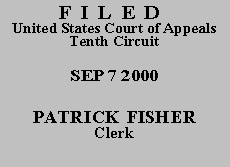

| JIMMIE OLEN STALLCUP,
Petitioner-Appellant, v. H. N. SCOTT, Respondent-Appellee. |
|
Jimmie Olen Stallcup appeals from an order of the district court denying his application for a writ of habeas corpus filed pursuant to 28 U.S.C. § 2254. Because Mr. Stallcup filed his federal habeas petition after the effective date of the Antiterrorism and Effective Death Penalty Act (AEDPA), that Act applies to this appeal. See Slack v. McDaniel, 120 S. Ct. 1595, 1602 (2000). In a habeas corpus proceeding in which the detention complained of arises out of process issued by a state court, an appeal by the applicant for the writ may not proceed unless a district or a circuit judge issues a certificate of appealability [COA] pursuant to § 2253(c). See id. at 1600; Fed. R. App. P. 22(b)(1). "If no express request for a certificate is filed, the notice of appeal constitutes a request addressed to the judges of the court of appeals." Rule 22(b)(2). We treat this appeal as an application for COA. We deny the application and dismiss the appeal.
Mr. Stallcup was sentenced by an Oklahoma state district court to a total of 260 years(1) after conviction on two counts of indecent or lewd acts with a child under sixteen, three counts of first-degree rape by instrumentation, and two counts of forcible oral sodomy, all after former conviction of two felonies. His victims were his daughters, ages six and nine. In his application for a federal writ of habeas corpus Mr. Stallcup claimed that his constitutional rights were violated at trial by twenty occurrences of ineffective assistance by his counsel and by improper remarks made by the state district court judge while instructing the jury in regard to inadmissible videotaped interviews of his victims. After a thorough discussion of Mr. Stallcup's claims, the federal magistrate judge recommended that the application be denied, and the district court agreed, adopting the magistrate judge's report and recommendations and denying the application.
Although not raised in his brief to this court, when analyzing Mr. Stallcup's claims, the magistrate judge applied a standard which authorizes habeas relief "'only when the state courts have decided the question by interpreting or applying the relevant precedent in a manner that reasonable jurists would all agree is unreasonable.'" Appellant's App. at 14 (magistrate judge's Report and Recommendation at 4), quoting Roberts v. Ward, No. 98-6066, 1999 WL 162751, at *7 (10th Cir. Mar. 25, 1999) (unpublished), cert. denied, 120 S. Ct. 589 (1999), second petition for cert. filed, (U.S. Feb. 4, 2000) (No. 99-8054). The Supreme Court, however, rejected that standard in Williams v. Taylor, stating that it was an erroneous "additional overlay." 120 S. Ct. 1495, 1521 (2000). Instead, an "objectively unreasonable" standard must be employed that distinguishes an "unreasonable" application of law from an "incorrect" application of law; i.e., in order to issue a writ of habeas corpus in regard to a state appellate court's application of the correct law to the facts, a federal court must find the state appellate court's application of law was not only erroneous or incorrect in its independent judgment, but also that the state court's application of law was unreasonable. See id. at 1521-22. Application of the Williams standard instead of the one applied by the magistrate judge does not affect the outcome of this application for a certificate of appealability, however. To determine whether Mr. Stallcup has made a "substantial showing of the denial of a constitutional right," 28 U.S.C. § 2253(c)(2), we must examine his application for a certificate of appealability in light of the decision rendered by the state appellate court.
The Oklahoma Court of Criminal Appeals (OCCA) applied Strickland v. Washington, 466 U.S. 668 (1984), to Mr. Stallcup's ineffective assistance of counsel claims. See Appellant's App. at 6-8. Other than arguing in a general manner that the court's conclusion was simply wrong as demonstrated by the number of alleged errors of counsel and the number of years to which Mr. Stallcup was sentenced, Mr. Stallcup has not given any reason why the court's application of Strickland to the facts of his case was unreasonable. Likewise, he fails to explain why the OCCA's conclusion that the trial court's allegedly prejudicial remarks were not improper because they (1) were valid "explanatory remarks regarding evidentiary rulings"; (2) "did not comment upon the guilt or innocence of appellant"; and, even if they could be viewed as improper, (3) were rendered harmless by appropriate jury instructions, see Appellant's App. at 9, is either incorrect or unreasonable. We thus conclude that Mr. Stallcup has failed to make a "substantial showing of the denial of a constitutional right." § 2253(c)(2). We decline to issue a COA and dismiss the appeal.
Entered for the Court
Circuit Judge
*. This order and judgment is not binding precedent, except under the doctrines of law of the case, res judicata, and collateral estoppel. The court generally disfavors the citation of orders and judgments; nevertheless, an order and judgment may be cited under the terms and conditions of 10th Cir. R. 36.3.
1. The sentences on five of the counts were to run concurrently after serving the sentence for one count of first-degree rape by instrumentation. See Appellant's App. at 11-12.